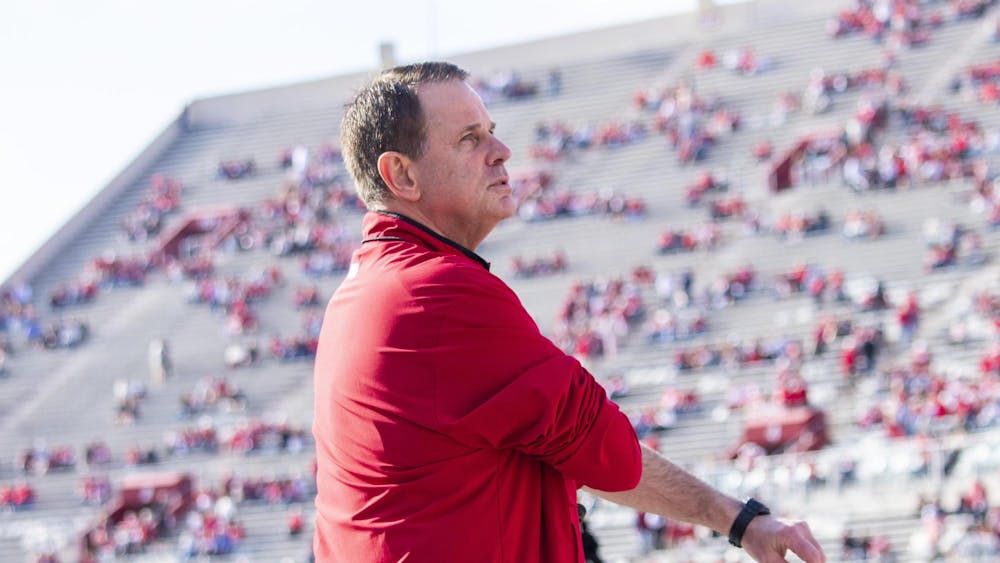When Kim Ruggles, a senior majoring in apparel merchandising, started her job search, she had a tough decision to make: Should she "out" herself as a lesbian on her resume? \nRuggles was involved in various leadership activities in the gay, lesbian, bisexual and transgender community at IU, but mentioning those activities might prompt interviewers to ask her certain questions. After careful consideration, she decided not to indicate her sexual orientation on her resume.\n"I felt like I didn't want to be judged positively or negatively based on my sexuality," she said.\nWhat Ruggles did, however, was carefully research companies' diversity policies before applying and determine whether they offered domestic partner benefits. \nShe said she found that many did. Even in the last two years, she said she has seen an improvement in the corporate climate for GLBT students entering the workforce.\nAnd she's not the only one who's noticed. According to the 2006 Corporate Equality Index, a yearly report issued by the Human Rights Campaign that evaluates corporate policies affecting GLBT employees, 138 companies nationwide received a 100 percent rating. That is an increase of 37 companies since last year's report and an increase of 125 companies since the report was launched in 2002. Companies were judged based on whether they provide domestic partner benefits and transgender wellness benefits and if they explicitly prohibit discrimination based on sexual orientation and gender identity. \nOnly two companies received a 100 percent rating in Indiana: Eli Lilly & Co. in Indianapolis and Cummins Inc. in Columbus. \nCummins representative Mark Land said the company believes offering domestic partner benefits to both gay and unmarried straight couples is just good business. Providing the benefits as well as actively promoting diversity helps the company not only recruit the best employees, but also retain them, Land said. \n"We work very hard to provide a good workplace, one where we've created an atmosphere where everyone feels welcome and diversity is embraced," he said. "This is another step in that process."
Domestic partner \nbenefits at IU\nThat good business sense also applies to educational institutions such as IU, where recruiting and retaining the best faculty is a major goal.\nDomestic partner benefits were offered at IU starting April 1, 2002, according to a 2002 human resource memo to full-time employees.\n"IU, like any other business, wants the best people to teach and study and research here," said Cindy Stone, administrator in the gender studies department and a former IU trustee. "Offering same-sex couples these benefits sent a message of a gay-friendly place that values diversity."\nStone, who was part of the task force created in the fall of 2000 to address the issue, knows firsthand how the lack of benefits can affect a same-sex couple. Stone's partner of 20 years died of cancer in 1995 and figuring out a way to care for her in the last year of her life was difficult, she said. Stone said she was only given two hours leave for her long-time partner's funeral because the University considered it a "friend's" funeral. \nStone is now one of 149 IU employees who are registered for domestic partner benefits, said Susan Brewer, University director of health care and welfare program services.
Not just a gay issue\nOne way IU differs from many businesses that it excludes straight unmarried couples from receiving domestic partner benefits. Stone said she feels this policy makes sense because unlike gays, straight couples have the option to enjoy the benefits of marriage.\n"Until we really have true equality, let's keep fighting for same-sex couples," she said. "Then let's worry about straight couples who choose not to get married."\nHowever, in the corporate world, offering the benefit to every unmarried couple makes more business sense and avoids some controversy, said Mark Brostoff, associate director of Undergraduate Career Services at the Kelley School of Business, who has won awards for his presentation for GLBT students preparing to enter the workforce.\n"(Domestic partner benefits) moved from being a gay issue to just good business practice," he said. "It softens it."\nBut even if the companies offer domestic partner benefits purely because of the bottom line, Brostoff said the outcome of increasing diversity in the workplace is what really matters.\n"Companies see they can make more money, more profit and at the same time hire more gay and lesbian employees. I'll take both," he said.\nBrostoff said diversity in U.S. business has undergone a major change in the last five years. But he still stressed the importance of gay students researching not only whether a company offers domestic partnership benefits, but also whether other indicators of acceptance such as GLBT employee groups and nondiscrimination policies are present. \nEven though more and more students chose to "out" themselves on their resume by identifying activities and internships related to the GLBT community, Brostoff said it is still a personal choice each student must make based on his or her comfort level. Some students choose not to specifically out themselves in their resumes, though they can still highlight the skills they gained during their experiences through a "functional" resume that is not activity-specific.\n"No one should have to make the decision to work in a hostile environment," he said, "whether they are gay or not"




